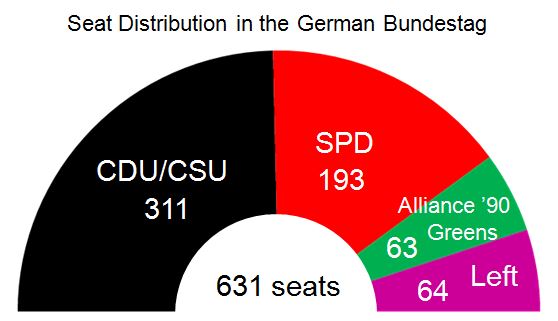Merkel’s Third Government
Stephan Wallace
Defense and Security Policy Analyst
Stephan Wallace is a defense and security policy analyst following political, military, and economic developments in Europe. He has worked more than 33 years on this area for the U.S. government, most recently for the U.S. Department of Defense.
The September 2013 Bundestag election gave Chancellor Angela Merkel’s center-right Christian Democratic Union (CDU) and its Bavarian affiliate Christian Social Union (CSU) their best result since 1990, but it also eliminated their Free Democratic Party (FDP) coalition partner from the next parliament. The CDU/CSU fell just short of an absolute majority of seats and were forced to turn to either the center-left Social Democratic Party (SPD) or the environmentalist Alliance 90/Greens to form a new government.[1] Despite some sympathy within the CDU for the Greens option, the CSU and most within the CDU preferred to renew their old coalition with the SPD, which had functioned comparatively well during Merkel’s first government from 2005 to 2009.[2] The parties began official negotiations on 23 October and by mid-December had reached agreement on the new government platform, operating principles, and division of ministries and cabinet posts.
The coalition agreement signed on 27 November by CDU Chairman Merkel, SPD Chairman Sigmar Gabriel, and CSU Chairman Horst Seehofer defines the new government’s principles and priorities, as well as the partners’ commitment to work together until the next scheduled election. The coalition partners agreed to operate on the basis of consensus and to present a united front in the Bundestag and its various committees and working groups. They pledged that none of the governing parties will attempt to find a new majority by working with the opposition parties.[3]
The CDU received five ministries in addition to the positions of Chancellor and Chancellery Chief of Staff/Minister for Special Affairs. The SPD controls six ministries and the CSU three. Although the CSU received a disproportionate share of ministries relative to its weight in the Bundestag, the six most powerful ministries were divided equally between the CDU and the SPD: the CDU controls the ministries for finance, internal affairs, and defense, while the SPD controls the ministries for foreign affairs, economics and energy, and justice and consumer protection.[4]
Leadership and Personnel Changes:
Ministry for Economic Cooperation and Development
Each of the coalition partners has a ministerial role in Germany’s foreign and security policy—the CDU through its control of the Chancellery and Defense Ministry, the SPD through its control of the Foreign Office, and the CSU through its control of the Ministry for Economic Cooperation and Development.[5] The coalition partners also divided control of the associated Bundestag committees, placing the Foreign Affairs Committee under CDU chairmanship, the Defense Committee under SPD chairmanship, and the Committee for Economic Cooperation and Development under CSU chairmanship.[6]
- Under the terms of the coalition agreement, each of the coalition parties has the right to nominate its own candidates to fill the ministerial posts and other offices assigned to it. The ministers have the right to nominate their own state secretaries and ministers of state.[7]
Article 65 of the Basic Law, which serves as Germany’s constitution, gives the Chancellor responsibility for setting the general guidelines of policy (Richtlinienkompetenz). In practice, this prerogative is constrained by factors such as coalition agreements,* internal party pressures, and responsibilities assigned by the Basic Law to specific ministries.[8]
- Article 65a vests peacetime command of the armed forces in the Minster of Defense.
- Article 96 states that the Justice Ministry will have responsibility for military courts exercising criminal jurisdiction during a state of defense or jurisdiction over members of the armed forces serving abroad or on warships.
- Article 112 requires the Finance Minister to consent to any expenditures in excess of appropriations or for purposes not contemplated by the budget.
Article 65 of the Basic Law also states that within the general policy guidelines set by the Chancellor, each minister shall conduct the affairs of his or her ministry independently and on his or her own responsibility, and that the government as a whole, not just the Chancellor, shall resolve differences of opinion between ministers (cabinet principle). The Chancellor’s control over government policy is further constrained in areas requiring cabinet decisions, such as, for example, foreign military deployments. These decisions are taken by majority vote and the Chancellor’s vote is only decisive in case of a tie.[9] Moreover, the coalition agreement provides that none of the governing parties may be outvoted in the cabinet on a matter that is of fundamental importance to it.[10] Such matters will therefore require a consensus.
SPD foreign policy spokesman Dr. Rolf Mützenich reported that the CDU/CSU made a failed attempt during the coalition negotiations to centralize the direction of security policy in the Chancellery by creating a national security council (Gemeinsame Lagezentrum) at the expense of the ministries. Mützenich claims the SPD was able to block this proposal, as well as another CDU/CSU proposal to weaken the requirements for Bundestag approval of foreign military deployments.[11] The CDU/CSU and the SPD were unable to agree on the latter issue and called for a commission to develop ideas by the end of 2014 on ways to bring the requirement for parliamentary approval in line with the need to reassure allies and partners that German military forces assigned to multinational formations can be counted on to fulfill their obligations in a timely manner.[12]
Germany’s system of coalition governments and divided responsibilities across ministries hinders the development of centralized control over foreign and security policy found in strong presidential systems like France or the United States. This increases the importance of developing contacts throughout Germany’s foreign, defense, and development assistance establishment to maintain situational awareness of German policies and activities and to maximize opportunities for international cooperation.
*During her meeting with Turkish Prime Minister Erdogan 4 February 2014, Chancellor Merkel used language from the coalition agreement to describe her government’s position on Turkey’s EU membership aspirations. Although Merkel noted her personal skepticism, she refrained from repeating her well known position—and that of the CDU/CSU—opposing full Turkish membership in the EU.
Stephan Wallace is a defense and security policy analyst following political, military, and economic developments in Europe. He has worked more than 33 years on this area for the U.S. government, most recently for the U.S. Department of Defense. He can be contacted by email at wallace.stephan@gmail.com. The views expressed are those of the author alone. They do not necessarily reflect the views of the American-German Institute (AGI).
[1] CDU/CSU bleibt größte Fraktion im Bundestag, Deutscher Bundestag, September 2013.
[2] “Seehofer lehnt Gespräche mit Grünen ab,” Die Zeit-Online, 24 September 2013.
[3] Deutschlands Zukunft gestalten – Koalitionsvertrag zwischen CDU, CSU und SPD, 18. Legislaturperiode, CDU, 27 November 2013.
[4] Pressemitteilung von CDU, CSU und SPD über die Ressortverteilung, CDU, 14 December 2013.
[5] Ibid.
[6] Severin Weiland and Christina Hebel, “Die Koalition kontrolliert sich selbst,” Spiegel On-line, 15 January 2014.
[7] Deutschlands Zukunft gestalten – Koalitionsvertrag zwischen CDU, CSU und SPD, 18. Legislaturperiode, CDU, 27 November 2013.
[8] Marin Limpert, “Richtenlinienkompetenze des Bundeskanzlers,” Deutscher Bundestag Aktueller Begriff Nr. 15/09, 19 February 2009.
[9] Ibid.
[10] Deutschlands Zukunft gestalten – Koalitionsvertrag zwischen CDU, CSU und SPD, 18. Legislaturperiode, CDU, 27 November 2013.
[11] Rolf Mützenich, “Außenpolitik mit sozialdemokratischer Handschrift!” 25 November 2013.
[12] Deutschlands Zukunft gestalten – Koalitionsvertrag zwischen CDU, CSU und SPD, 18. Legislaturperiode, CDU, 27 November 2013.








